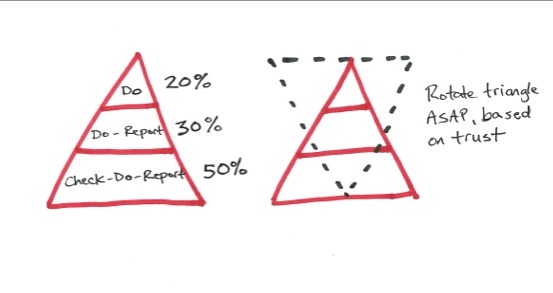3 Words That Make Delegation Clear
Check. Do. Report.
You might hear a sentence like this spoken at the place I work:
Supervisor to assistant: “This is a ‘Do – Report’ task. Please reach out to the senior leaders for their input from our calendaring meeting, and then report back to me with a summary of their comments.”
“Check – Do – Report” is called the Delegation Triangle model in a leadership training course we require of all staff at our church, called Model-Netics. I’ve blogged previously on the what and why of this course for us. This simple delegation language is known by our employees.
Do items: Full discretion to complete task
Do – Report items: Full authority to do task, but report back when complete
Check – Do – Report items: Check with supervisor first for instructions and authority; do the work; report back
Early on in a delegation relationship, many delegated tasks will be “Check – Do – Report.” Over time, as trust and competence increases, delegation of many tasks moves to “Do – Report,” and finally, “Do.”
When it’s taught in Model-Netics, this principle is demonstrated by a triangle (pictured). Overtime, the supervisor wants to flip the triangle so only 20% of the delegated tasks are in the “Check – Do – Report” compartment, and the majority of tasks are in the “Do” compartment.
“A common language sets clear expectations for the delegate”
Some delegated tasks will always require checking in before launching, doing, and then reporting back to you. But a common language sets clear expectations for the delegate. In contrast, when I tell someone this is a “Do” task, it communicates authority and trust for them to complete the task, and only put me in the loop if something goes awry.
Practical Takeaways:
- Trial this with the person you delegate to most often;
- Explain the concept and meaning behind words;
- And try it out for a few weeks.
Like me, you’ll likely find that these three simple words communicate a lot and lessen the need for delegation follow-up.

